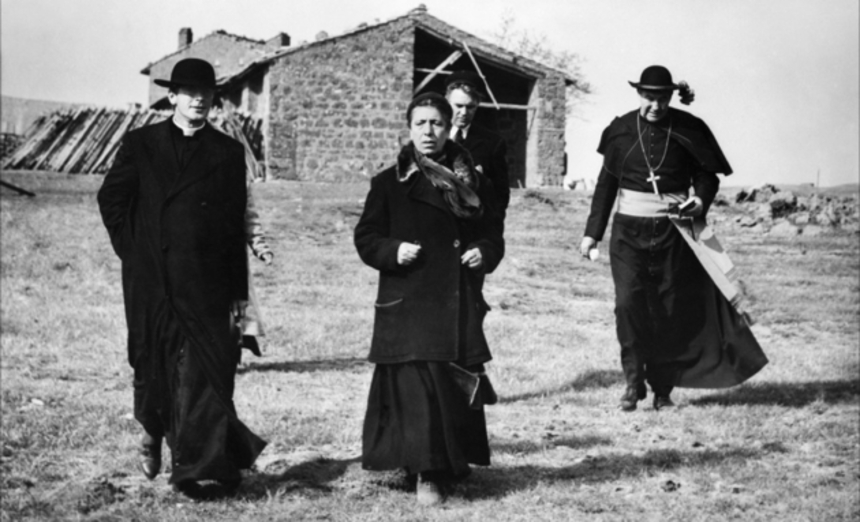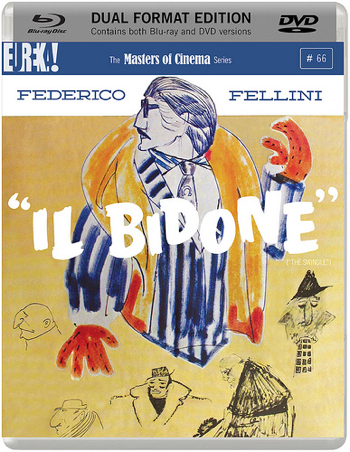Learning From The Masters Of Cinema: Federico Fellini's IL BIDONE

After the breakout success of his third feature, La Strada, many people hoped and expected Federico Fellini would deliver a sequel, continuing the onscreen adventures of Giulietta Masina's heroine Gelsomina (apparently even Walt Disney was a fan). However, despite the film winning a raft of awards around the world, including the Academy Award for Best Foreign Language Film, Fellini had eyes on revisiting another of his earlier creations, his autobiographical protagonist from I, Vitelloni, Moraldo. But when those plans were scuppered, the Italian instead decided to develop a new idea, focusing on the lives of petty criminals and con artists, the likes of which he had encountered during the filming of La Strada.
Il Bidone (or The Swindle) is less a strict narrative, but rather a series of vignettes following the nefarious dealings of a group of bidonistas who prey on the poor and easily-manipulated in order to fund their lavish, hedonistic lifestyles in the city. Fellini's primary focus is Augusto (Broderick Crawford), a slovenly middle-aged grifter whose best years are already behind him and who struggles to enjoy his life, despite having the ready cash to splash out on champagne and women in the city's best nightclubs.
While his partners in crime, Roberto (Franco Fabrizi) and Picasso (Richard Basehart), have aspirations beyond the next con - Roberto wants to be a singer, while Picasso has a family to provide for and dreams of becoming a painter (hence his nickname) - Augusto has nothing to live for but il bidone. That is until his teenage daughter (Lorella De Luca) comes back into his life looking for financial support to see her through her university course. The reunion proves something of a wake-up call for Augusto, but knowing of no other way of life, his best efforts to come through for his daughter prove tragically unsuccessful.

While Fellini's work would become more upbeat, surreal and carnivalesque in later years, Il Bidone forms the central instalment of his informal "Trilogy of Loneliness" together with La Strada and Nights of Cabiria. All three films feature the wonderful Giulietta Masina (in Il Bidone she has a minor role as Picasso's wife, Iris) and adhere more to the code of Italian neo-realism than much of the director's later work. Il Bidone might also be the closest Fellini came to creating a genuine genre film, as his downbeat crime drama hits many of the same narrative notes as Hollywood's film noirs of the 40s and 50s. In fact it is suggested that Fellini's first choice for Augusto was Humphrey Bogart, and he also considered Rififi's Jean Servais before spotting Crawford in a torn poster for his Oscar-winning role as corrupt politician Willie Stark in Robert Rossen's All The King's Men.
Fellini has always been vocal about his refusal to pass any kind of moral judgement on his characters. Augusto is clearly a flawed character who willingly impersonates priests and civil servants in order to swindle trusting village folks out of what little money they have, but ultimately he is just a man. You only need look at the film's final scene to see how Fellini really feels. Augusto attempts to convince his new criminal cohorts that he has had a change of heart, and has returned their ill-gotten gains to their victims on discovering they had a disabled daughter - about the same age as his own child. This proves to be a lie. Augusto has kept the money to give to his own daughter, and his unforgiving gang proves less than forgiving. However, Fellini's final shot shows us that Augusto's demise goes entirely unnoticed and life carries on regardless.
While less well-known than the other segments of Fellini's Trilogy of Loneliness, Il Bidone is a lighter and more enjoyable experience than La Strada, and in the current economic climate has never felt more relevant. With films such as David O'Russell's American Hustle and Martin Scorsese's The Wolf of Wall Street being praised and decorated by awards bodies the world over, and whose characters' real-life counterparts go largely unpunished while their victims struggle to survive, Augusto shares more than a little in common with DiCaprio's Jordan Belfort and Christian Bale's Irving Rosenfeld. There has never been a better moment to revisit, or to discover, Fellini's own take on the same subject from 60 years ago, handled in similar non-judgemental fashion by one of the world's greatest filmmakers.
Masters of Cinema have released Il Bidone in a Region B dual-format Blu-ray and DVD 2-disc set, featuring a brand new 1080p high definition master of the film. Supplements include an interview with Dominique Delouche, who served as Fellini's assistant director on Il Bidone, Nights of Cabiria and La Dolce Vita, in which he talks at length about his relationship with the Italian auteur. The release also includes the original theatrical trailer and a 48-page booklet that features writing on the film by Pasquale Iannone and Andre Bazin, an interview with Fellini conducted by Delouche, together with two pieces written by Fellini himself reflecting on this period of his career.
Il Bidone is available now.

Do you feel this content is inappropriate or infringes upon your rights? Click here to report it, or see our DMCA policy.






